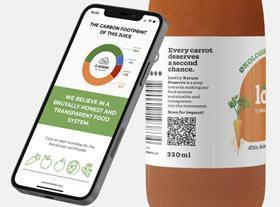
Supplying sustainable products is currently the fastest way for any business to grow, according to Anantha Peramuna, CEO of Denmark-based Nature Preserve, whose blockchain-based traceability and climate impact analysis algorithms seek to help agri-food businesses to be both transparent and sustainable. 'However, in tomorrow’s market,' he adds, 'it will be the only way to grow.'
Nature Preserve's software allows companies to track both the inventory flows and climate impact of food products throughout the supply chain, assisting businesses in understanding and reducing their carbon footprint, in saving money by reducing food loss and waste, and in engaging with consumers to increase brand loyalty.
'Food systems represent a third of greenhouse emissions and according to published research, the impact may vary 50-fold among producers of the same product, so there is a lot of room for food businesses to minimise the impact,' says Peramuna. 'It's something we each consume every day, so it's personal, and we all have some influence with our wallets. With all the talk of climate change, there is a shift slowly happening. In school, children are learning about climate change, and food companies are seeing the trend toward sustainable products.'
Nature Preserve started in 2018 with the mission of fighting food waste, experimenting with dehydrating surplus fruit and vegetables for smoothies and developing a mobile food pureeing unit. One result was a juice named 'lovi', with 25 per cent of its content coming from surplus carrots grown on Danish farms.
'In early 2020, we went looking for services to understand the impact of our own production,' says Peramuna. 'The services we found were either too expensive, too static or too generic. Besides, we could not see how this extra cost could make us more environmentally and financially sustainable.'
Unable to find a sensible tool or service, the company decided to build its own. 'That is the curse of having multiple PhDs in your team,' says Peramuna. 'We now have a system, and it’s easy to contribute data and find out where the hotspots are in order to make changes, all in real time. It’s also a communication platform allowing you to keep consumers directly informed. There is a need to make it easier for consumers to understand sustainability issues. Thanks to a grant from the Danish government, we’re currently testing to see how consumers navigate through our technology, making sure there is enough information but not too much.'
The debate about the perils of bombarding consumers with labels and product information is well-trodden, but Peramuna believes the dangers are exaggerated. 'People are not as confused by labelling as many seem to think,' he says. 'In reality, it’s often an excuse for not doing anything. Imagine how confusing the first nutritional labels were. But you have to explain and educate.'
For Peramuna, one of the main issues for businesses calculating their impact is the complexity of food supply chains.
'Companies tend to know only one step forwards and one step back, so they don't have full visibility,' he says. 'Having worked with food waste, we have gained experience working with many different parts of the supply chain from farm to fork. Using this wealth of experience, we give companies that visibility, first by helping them to map out their supply chains and then by making it easier and affordable to calculate and communicate their impact.'



